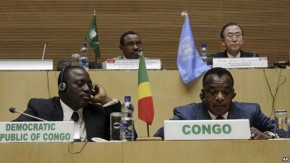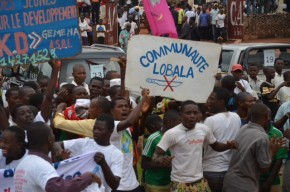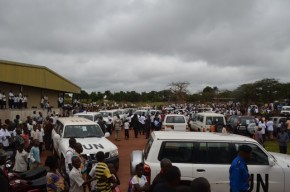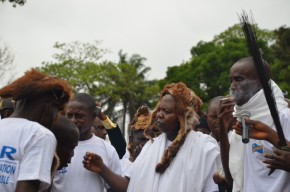
Leaders from 11 countries met yesterday (Sunday 24th Feb) in Addis Ababa and signed a Peace, Security and Cooperation Framework agreement intended to bring peace to the eastern provinces of the Democratic Republic of Congo. After nearly a year of renewed fighting in eastern DRC between rebel groups and the Congolese Army, the number of internally displaced people increased by one million to 2.7 million. This comes after months of negotiations and was welcomed by the UK Government in a statement by the Foreign Office Minister, Mark Simmonds.
Meanwhile, last week another peace agreement was signed, at a much more local level, reminding us that conflict in the DRC is not just about the east of the country. Last Monday, following a two year peace process, members of four communities met in Equateur province to sign non-agression accords.
The inyelle rebellion

In 2009, long-standing socio-economic and political tensions between two tribal groups, exacerbated by local tensions over access to fishing ponds, exploded into a conflict that caused 200,000 people to flee their homes. The initial burst of conflict rapidly drew in local politicians and businessmen and the dispute was rapidly transformed into an armed rebellion that became a platform for others to vent political grievances, including troops loyal to Mobutu living in neighbouring Republic of Congo. The rebellion and the impact on thousands of families demonstrates how fragile peace in the DRC really is and how important it is for us to understand the local political economy and conflict drivers. More than that, it illustrates the potential for instability way beyond the headlines of eastern DRC.
A local peace accord

Last week, I accompanied the UN Secretary General's Deputy Special Representative, the national Minister of Interior and the diplomatic corps to Gemena in northern Equateur to witness the signing of the peace accords between these communities. After two years of reconciliation work and repatriation efforts, the ceremony brought together the four communities. Despite my heart dropping as I was bundled into one of a 25 car convoy from the aiport to the ceremony (maybe I should just get over my dislike of the idea of these jamborees), it was a fascinating day and in fact an interesting example of senior political engagement in a province that is often ignored by national and international press.

The ceremony itself - arranged by the UN peacekeeping force, MONUSCO and the national government, was an interesting insight into local conflict resolution. It was also surreal at times, particularly the smoking ceremony, where the men from each of the four communities - having handed over their weapons to the interior minister - chain-smoked together as a sign of their new-found solidarity and brotherhood. More disturbingly, this was followed by a ceremony designed to demonstrate the invincibility of the tribes represented, that included young men from the four communities jostling in line to be whipped.This local peace process was a practical illustration of the importance of action on local conflict in the DRC, the subject of Séverine Autesserre's book "The Trouble with the Congo".
It struck me, watching the violent display of strength and personal resilience in Equateur last week, how different this ceremony would have been from the pomp and ceremony of the events in Ethiopia, but also how important it is that we focus on the local causes of conflict and ensure that our diplomatic and development interventions go beyond the east.

1 comment
Comment by Andrea Strycker posted on
Pete, your chronicle of these events was welcome news to several of us who work with ReachGlobal in Equateur province. Shortly after the conflict subsided, one of our volunteer licensed psychologists provided trauma counseling training to ECC/17 CECU pastors in the area seeking to bring comfort to those in distress. Others supported the doctors at Tandala Hospital in treating some of the victims. The signing of non-aggression accords brings some closure to the experience. Your statements regarding local causes of conflict resonate deeply with us. Thank you for highlighting this far too often overlooked concern in DRC.